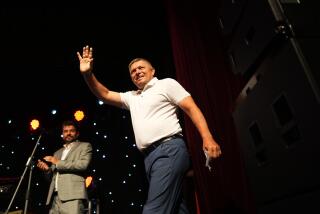Toppling Milosevic
- Share via
Slobodan Milosevic’s days as president of Yugoslavia seem to be numbered. Huge crowds attend anti-Milosevic rallies and his allies in the cabinet are deserting him. A leading opponent gave him 15 days to resign or face massive street demonstrations when students and workers return from summer vacations. Now is the time to step up support for the nonpartisan opposition forces, especially for independent media in and around Serbia, and groups such as the Orthodox Church and nongovernment organizations that are able to span the fractured spectrum of political opposition.
Much is made of the splits in Serbia’s opposition. The new U.S. ambassador to the United Nations, Richard Holbrooke, who brokered the Dayton peace accord for Bosnia, said “it is the tragedy of Serbia” that there is no clear leader around whom the opposition can rally. Certainly, toppling Milosevic would be easier with a leader of the stature of Myanmar’s Aung San Suu Kyi. But opposition groups on the right, center and left are united in calling for Milosevic’s removal. And differences among the opposition factions could in the end be useful, serving as the basis for creation of political parties to contest the next election.
Milosevic’s government, made up largely of Socialists and extreme nationalists, is crumbling. The richest man in Serbia, Milosevic crony Boguljub Karic, resigned from the cabinet, as has Mirko Marjanovic, the prime minister. Other defections may follow.
Milosevic, an indicted war criminal, is too cunning and ruthless to quit his bloody rule voluntarily. His latest ploy is to hold an election in late November, a move that would legitimize either his continuation in power or his departure. Washington and European capitals are taking no sides on this issue, and they shouldn’t. Milosevic and the ultra-nationalists would exploit this “interference” in Serbian politics to inflame anti-Western sentiment.
Key opposition leader Vuk Draskovic oddly supports the election, arguing that Milosevic would lose. That’s hard to imagine with Milosevic organizing the ballot and controlling the government, the media and security forces. And, in any case, the results of any election held while Milosevic is in power would be tainted. Although not saying so publicly, the Western allies prefer an election organized by a transitional government picked from among respected, nonpolitical professionals. They even invited a possible leader of such transitional authority, the former Yugoslav National Bank governor Dragoslav Avramovic, to the Sarajevo security summit last month.
The West’s most potent weapon against Milosevic is his total economic isolation. Assistance to his opposition must be scrupulously nonpartisan. Siding with one group or another would backfire, no matter who comes out on top. The best candidates for aid are the independent Serbian media, the Orthodox Church and nongovernment organizations. Removing Milosevic from power is a task for the Serbs themselves.
More to Read
Sign up for Essential California
The most important California stories and recommendations in your inbox every morning.
You may occasionally receive promotional content from the Los Angeles Times.










